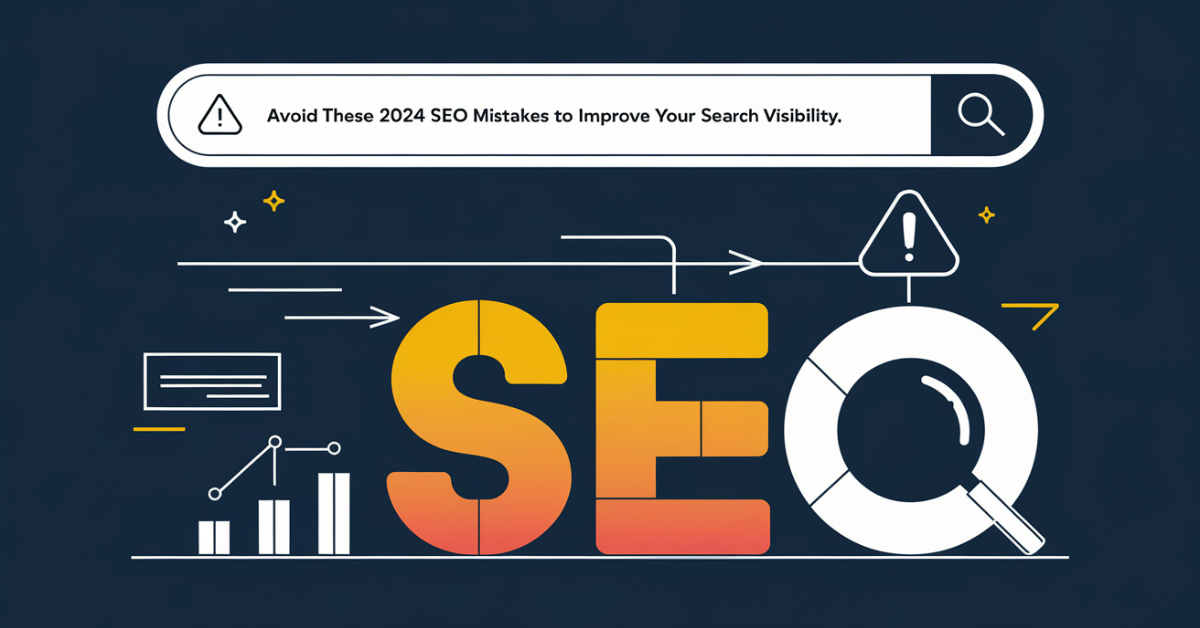In the fast-paced world of digital marketing, SEO strategies continue to evolve, and what worked last year might not be as effective today. With new algorithms and changing search behaviors, staying up-to-date is crucial to keeping your website visible in search engine results. In 2024, some common SEO mistakes could significantly impact your search rankings and, ultimately, your site’s visibility. Here’s a breakdown of the top SEO mistakes to avoid this year to ensure your website stays competitive and relevant in search results. Neglecting User Intent A fundamental SEO mistake in 2024 is failing to align your content with user intent. Search engines like Google have advanced algorithms that prioritize content matching what users are genuinely searching for, not just keyword-heavy pages. Beyond just targeting keywords, grasp the purpose behind users’ searches. How to Avoid It:Identify and categorize search intent as informational, navigational, or transactional, and create content accordingly.Use tools like Google Analytics and keyword research tools to understand which queries bring users to your site, then tailor your content to meet those needs. Ignoring Mobile Optimization In 2024, mobile-first indexing is more important than ever, as the majority of web traffic comes from mobile devices. Google now primarily uses the mobile version of content for indexing and ranking, so a poorly optimized mobile site will directly impact search visibility. How to Avoid It:Make sure your website is flexible and adjusts smoothly to different screen dimensions.Leverage tools such as Google’s Mobile-Friendly Test to detect and resolve issues with mobile usabilityFocus on fast loading speeds and seamless user experience for those on mobile devices Overlooking Core Web Vitals Core Web Vitals are metrics that Google uses to evaluate page loading speed, interactivity, and visual stability, which collectively affect user experience. In 2024, Core Web Vitals remain an essential ranking factor, so neglecting them can harm your search visibility. How to Avoid It:Use tools like Google PageSpeed Insights or Lighthouse to assess and improve your Core Web Vitals.Focus on improving Largest Contentful Paint (LCP), First Input Delay (FID), and Cumulative Layout Shift (CLS) by optimizing images, reducing third-party scripts, and ensuring stable layout loading. Not Updating Content Regularly Creating content is essential, but keeping it updated is equally important. Outdated content can harm your authority, user trust, and search visibility. Google favors sites that regularly refresh their content, indicating they provide timely and relevant information. How to Avoid It:Perform periodic content reviews to pinpoint pages that require updates or enhancements.Update data points, add new insights, or incorporate recent trends in your content to keep it relevant.Use Google Search Console to identify declining traffic pages, which often signals that they need a refresh. Misusing Keywords Keyword stuffing or ignoring keyword research altogether are classic SEO mistakes that still occur. Overusing keywords can lead to penalties, while insufficient research can leave your content irrelevant or uncompetitive. How to Avoid It:Prioritize long-tail keywords that reflect specific user intent instead of overly competitive single-word keywords.Integrate keywords naturally, focusing on readability and user experience rather than sheer density.Use related and semantic keywords to enhance content relevance and avoid repetitive phrasing. Neglecting Internal Linking Many website owners underestimate the power of internal linking, which helps search engines understand site structure and hierarchy. Poor or inconsistent internal linking can cause search engines to overlook important pages, diminishing their chances of ranking. How to Avoid It:Add internal links to related articles or pages on your website to help both users and search engines navigate your content.Link from high-authority pages to lower-ranking or new pages to spread “link juice” and improve their visibility.Use relevant anchor text that describes the linked content, as this helps search engines understand its context. Ignoring Technical SEO Technical SEO can be challenging but is essential for search engine crawlers to access and index your content. Issues like broken links, unoptimized XML sitemaps, or a lack of HTTPS can undermine your SEO efforts. How to Avoid It:Perform regular site audits with tools such as SEMrush or Ahrefs to detect and resolve technical issues.Ensure your XML sitemap is up-to-date and submitted to Google Search Console.Prioritize security by using HTTPS, as it is a trust signal for users and a ranking factor for Google. Not Using Structured Data Structured data (or schema markup) helps search engines understand your content better and display it as rich snippets in search results. This can improve your click-through rate (CTR), which indirectly boosts your search rankings. Skipping structured data can mean missing out on these visibility-boosting features. How to Avoid It:Implement schema markup for content types like FAQs, reviews, events, and product listings.Perform regular site audits with tools such as SEMrush or Ahrefs to detect and resolve technical issues.Follow schema guidelines to avoid spammy or inaccurate markup that could lead to penalties. Overlooking Local SEO Local SEO is crucial for businesses targeting customers in specific geographic regions. Ignoring it can mean missing out on potential local customers who are looking for products or services nearby. How to Avoid It:Set up and optimize your Google My Business profile with accurate business information, contact details, and customer reviews.Use location-based keywords to attract local customers and engage in local link-building strategies.Motivate happy customers to leave reviews, as positive feedback can boost your local search rankings. Relying Solely on AI-Generated Content AI-generated content is convenient, but relying on it entirely is risky in 2024. Search engines are improving at detecting low-quality or overly generic AI-written content. Focusing solely on automated content can result in lower engagement rates and potential ranking penalties. How to Avoid It:Use AI as a content aid rather than a substitute, combining it with human input to maintain quality and originality.Add unique insights, personal experiences, or expert opinions to create more valuable and distinctive content.Ensure that the tone, voice, and style of your content resonate with your target audience. Conclusion In 2024, effective SEO requires a comprehensive approach that emphasizes user experience, high-quality content, and technical optimization. Avoiding these common mistakes can make a substantial difference in improving your website’s search visibility. Regularly


